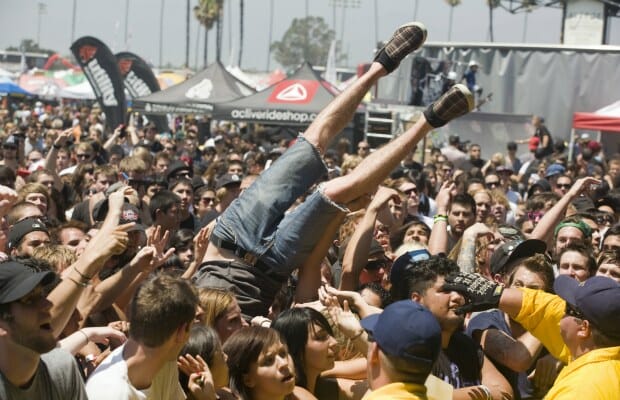No Room for Rockstars

Director Parris Patton documents the rock ’n’ roll life, profiling musicians taking part in the 2010 Vans Warped Tour in No Room for Rockstars. While the documentary doesn’t offer any novel or deep revelations about the price of chasing stardom, Patton’s film captures lives at critical crossroads: The musicians portrayed all find themselves negotiating the tightrope between commercial compromise and staying true to oneself, between self-belief and crushing despair. Those themes of struggle are nothing new in studies of artists (especially those in the music business), yet the humanist elements inherent in Patton’s film make its consistently compelling, even profound.
Patton follows several personalities at various points on the scale of rock-music success. At the scrappier end of that scale are the members of the pop-punk outfit, Forever Came Calling, who haul themselves cross-country in a beat-up van on the heels of the Warped Tour, selling copies of their self-produced demo to music fans at every stop. Courting the attention of the mainstream media, meanwhile, are death-metal act Suicide Silence along with teenage pop stars like Chris Drew—a Justin Bieber lookalike mining an Emo-meets-Bob Dylan groove—and Mike Posner, who’s got the requisite silky voice and smooth vibe to make him a worthy Justin Timberlake protégé.
What makes watching these personalities worthwhile has less to do with who they are as with the intrinsic charms of turning on a camera to document the details of human life. On that level, No Room for Rockstars resonates with notes of sadness and anxiety as its subjects all radiate a kind of nervous desperation wrestling with an authentic love for the music. The former threatens to overwhelm the latter in the cases of Forever Came Calling, always in danger of running out of gas money, and Chris Drew, a burgeoning teen idol, whose passion for music runs aground thanks to the demands of rising fame.
-

-

-

-

-

-

-

-

-

-

-

-

-

-

-

-

-

-

-

-

-

-

-

-

-

-

-

-

-

-

-

-

-

-

-

-

-

-

-

-








































